Yet another post after a long silence. This time, the silence is 2 months long. Those days where I can keep my blog updated at least once a week seem unaccomplishable looking back from now. Simply put, I've been busy with so many things that I've neglected my blog.
With a bit of luck, this blog could be up and running at full steam once again since I'm now on a 4-month long summer break. Yes, 4-months long! Despite celebrating the fact that I'll be free for 4 long months, an unexplainable feeling of sadness has crept over me, knowing that I'll be progressing to another stage of my life, that is from Foundation to Undergraduate.
Time Flies
Time flies like and arrow, always in the forward direction, never backwards. I could still remember as vivid as yesterday the time when I was exploring and getting to know people around the campus of the University of Nottingham. Sometimes I feel one year is too short to fully familiarise ourselves with the environment here. There are still many people here who had been in the same class as me whom I do not know. Even in my last semester, I finally got to know the names of some of the people I've met once too many. At times, this short time period may fail to create strong friendship bonds, especially with the summer break where fellow course-mates are separated by distance for 4 long months.
Foundation Life
Life in Foundation is a major change from secondary school life. Learning to live without parents, spending more time with friends instead of family, greater freedom... I would say I'm pretty much used to this life already, although I find myself lazy and preferring to rely on parents when I'm back home. Meeting friends after class has never been easier with friends living within metres of each other. Weekends are usually spent going out or having the occasional DotA party.
Thoughts on Studies
Much of the time spent in Foundation is about studies, assignments and studies. The lecturers were OK, each with their own distinctive style of teaching. When it comes to marking tests and exams, their grading criteria can range from extremely lenient to awfully picky. On one occasion, a lecturer gave me extra marks for my Maths quiz when I went to see him, even though I was careless when answering the question. Yet another lecturer deducted points for another quiz simply because my answers were not presented in one line. "Your answers are scattered everywhere," she said (or something to that effect; I forgot the exact words). "I did underline the answers though...," was my reply. No point arguing.
Speaking about Maths, the Maths modules are the ones I love to hate. Firstly, I've always enjoyed a love-hate relationship with Maths - love because it is an essential part of Physics and Engineering and hate when things get too complicated. Come on, do we really have to differentiate an expression with powers here and there and then simplify them? I bet a real-life engineer wouldn't encounter such an expression to differentiate while doing his job; even if he does, there's such a thing called a computer that will gladly churn out the answer in a mere milliseconds with near 100% accuracy (taking into account the fact that computers can have bugs too). Can't risk a human error here.
Overall, I had learnt quite a lot (and forgotten most of them too) during my Foundation course. But sometimes I think a blending of social science subjects like economics into the course would be useful...
To all my Nottingham Foundation friends, we shall meet again as fellow undergraduates in September.
UPDATE: A section of this post has been deleted due to reasons I would not discuss here.
Tuesday, May 26, 2009
Goodbye, Foundation
Saturday, March 21, 2009
Assignment: Virtual reality poster
Di rin ove sc g Creating A Virtual Reality Environment 1. System and Software Computers are used to develop and run the software necessary to create virtual environments. Console Workstation Game Software 2. Immersion Sensory stimulation must be consistent if a user is to feel immersed within a virtual environment. Head-mounted Displays VR Dome Simulator 3. Interactivity Immersion within a virtual environment is one thing, but for a user to feel truly involved there must also be an element of interaction. Motion Trackers Wired Gloves 3D Controllers Applications of Virtual Reality Military Training Virtual Therapy Immersive Gaming © 2009 http://polywj.blogspot.com/
This is the poster I created for Digital Media's Assignment 1, with lots of input from my groupmates of course.
Sunday, March 15, 2009
Busy final semester
Before I knew it, I'm now in the last semester of my Foundation studies in Nottingham University – not to mention that I'm halfway through it already. Two semesters seem to be a long time, but yet less than 9 months has passed since I started my course here. If I were to say the 9 months is short, it's not either. Much has happened since the day I got here that made the 9 months seem much longer. It's probably the departure from school life that made the days here feel more packed, hence 'longer' because much more has been done each day.
It's impossible to find another busier time to update my blog other than the middle of the semester, but if you hadn't noticed my blog hasn't been updated for 3 weeks. Besides, I haven't been providing any updates related to this semester. Although it has been only been 6 weeks, much has been done that can be filled into several blog posts. But sadly, all of these occupied my time until I've no time for blogging. The first week of this semester, I already went hiking up Bukit Lalang (Broga Hill) early in the morning at 5 am – and that was done during a weekday where I have an English class at 11 am. I've some photos of the scenery that I took which I’d like to post here if I'd time. The rest of the weeks were not devoid of other activities; my friends and I celebrated the birthdays of 5 friends – Esdelyn’s during the third week, Rod's and Hwa Siang's during the fourth week, and just recently Weng King's and Hui Yen's. During this semester I also joined two clubs that I’m interested in: Robotics and Tai Chi.
Moving on and as per the convention, I'm going to give a brief overview of the modules I’m taking this semester.
Foundation Mathematics (HG1 FND)
Lecturers: Mr. Balrama, Dr. Rohaizan, Ms. Thong
Tutor: Ms. Grace Yap
Duration: 2 hours lecture, 1 hour of tutorial class per week
This module continues from last semester, which means that everything including topics and marks will be carried over to this semester. Most of the topics to be covered this semester are calculus-based, from applications of differentiation to integration. This is the first time I'm having a Malay lecturer. Mr. Balrama is no stranger to us, having taught us since the first semester.
Applied Algebra for Engineers (HG1 M02)
Lecturers: Dr. Harikrishnan, Ms. Thong, Dr. Rafi
Tutor: Ms. Grace Yap
Duration: 2 hours lecture, 1 hour of tutorial class per week
Another maths-based module. Nothing much to say here because it's also well, about mathematics, with topics from matrices, vectors to 3-D geometry. Dr. Rafi is another Malay lecturer here, but so far it hasn't been his turn to teach us yet.
Electricity and Magnetism B (EN0 EMB)
Lecturer & Tutor: Mr. Lim
Duration: 2 hours lecture, 1 hour of tutorial class per week
The only science-based module in this semester. Pretty disappointing because the previous semesters we had three. The topics involved which are magnetism, inductance and alternating current are not really my favourite. However, we're glad to have Mr. Lim from Semester 0's Basic Engineering Mechanics A back as our lecturer.
Digital Media (XXA C04)
Lecturer & Tutor: Ms. Geetha
Duration: 2 hours lecture, 1 hour of tutorial class per week
Ms. Geetha is also a lecturer from Semester 0. She taught us Information Technology & Design then. For the first few weeks of this semester we learned about multimedia, namely audio, video and 3-D animation. The problem is nothing practical was taught, and we were expected to produce edited versions of audio and video by ourselves. For our group assignment, we have to produce a poster and a short 3-D animation. Our lessons now are about JavaScript – not a problem since I’m quite familiar with it already.
Communication Technology (XXA C05)
Lecturer & Tutor: Ms. Yong
Duration: 2 hours lecture, 1 hour of tutorial class per week
For an tech-enthusiast like me, anything that has a whiff of the letters "I" and "T" should spark an interest. Despite that, what was taught in this module is plain boring – I guess even technology has a boring side. I would say it's good to know how a network operates, but learning about types of cables and network topologies has no practical value. They're either forgotten quickly, obsolete after 5 years or couldn't be bothered by people unless they're network technicians. And I hate memorizing.
English Language and Study Skills B (EN0 ELB)
Lecturer: Mr. Emmet Whelan (Profile)
Duration: 4 hours per week
This module is not so much about English as were previous English modules. 60% of our marks will come from our group assignment – and that's a big project. We have to do a research – not the usual getting-information-off-the-internet kind of research – but much more. We have to get the data ourselves by conducting a survey; that means distributing questionnaires to people and analyzing the data. My lecturer is the same as last semester's, and we got to know quite a lot about him already.
Lab
Supervisor: Mr. Tan
Duration: 2 hours per week
As usual. The difference is that we have only 3 experiments, thanks to reduction in science-based modules.
Finally, no government compulsory subjects this semester.
Writing such a long blog post surely takes a lot of time and effort. You should see why I’m sort of regretting it when you see my to-do list:
- Digital Media Assignment – I'd done the poster (will post it here sometime this week), but we seem to have trouble with the animation.
- English Assignment – We haven't done the research yet. Hopefully you guys can help me fill in the questionnaire.
- Communication Technology Assignment – Practically untouched.
Apart from that, there're mid-term tests, maths quizzes and homework coming our way. Very busy, that is.
Monday, December 8, 2008
End of the year, end of the semester
It's approaching the end of the year, but this year, it just doesn't feel like it. For the past 18 years, year end equals to long holidays and long holidays equal to year end. This year is different.
End of the Semester Rush
Although my semester finals are in January, this time is practically the end of the semester where classes end. Yet, mid-term examinations are still ongoing with me having Electricity & Magnetism and Moral Studies exams next week. This means that for some modules, we won't be learning much between these two exams. There is, however, Christmas break between them, before we face the 'ultimate' exam covering all the stuff we learned in this semester.
The end of the semester is also the time where assignments are due. I still have English, IT and Moral Studies assignments to complete, and I'm starting to wonder why do I have to do all these at the last minute. Well, I'm quite used to this kind of situations given my tendency to procrastinate, but I just hope that the current situation permits me to hand up my assignments on time without affecting my exams.
The Weather
Studying in a UK university is no fun without experiencing UK's weather. But in the University of Nottingham Malaysia Campus, I'm glad to say that I'm experiencing it partially. Take a look at this week's weather forecast for Kajang (the nearest major town):
I couldn't find a website which offers weather for Semenyih, but I can assure you that the weather here is colder, though not as cold as in Nottingham, UK which is snowing. But then again, we have the equivalent of snow at the Malaysia campus:
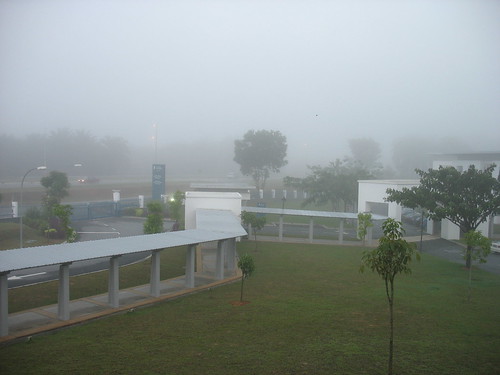
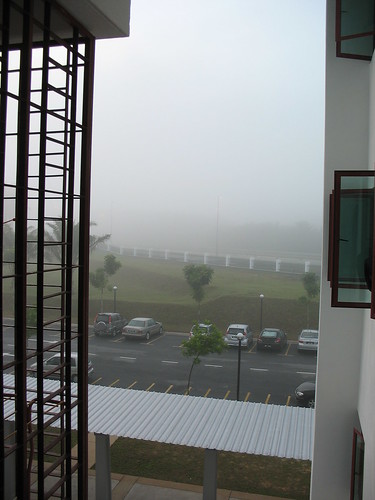
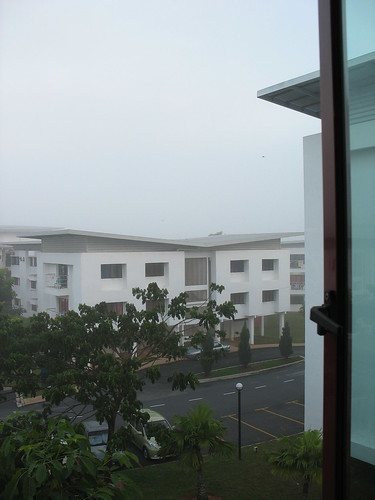
(Where did the faraway hills go? Compare it with the last photo in this post.)
Those photos were taken at 7 am two weeks ago. This place could be a resort if without the mounting pressure...
Tuesday, December 2, 2008
Oral Presentation: SpaceShipOne
SpaceShipOne Revolutionizing Space Tourism Outline • What is SpaceShipOne? • History • How does SpaceShipOne work? • Beyond SpaceShipOne The First Non-Government Manned Spacecraft Three-person vehicle for suborbital spaceflight Designed by Scaled Composites, a company founded by aerospace engineer Burt Rutan Funded by Paul Allen, co-founder of Microsoft 1996 - Concept design work and some preliminary development April 2001 - Full development program began in secrecy April 1, 2004 - Scaled Composites received the first license for sub-orbital rocket flights June 21, 2004 - First spaceflight October 4, 2004 - Won the $10 million Ansari X PRIZE White Knight carries SpaceShipOne to about 15,000 meters above the Earth. Accelerate almost vertically at 3 g’s. More than 100 km above the Earth. Speed: 3000 km/h Weightlessness The ship's empennage converts (using pneumatic-actuated 'feather') to a stable, high-drag shape 5 or 6 g's of deceleration Parabolic trajectory Turns into a glider at about 16,000 metres above the Earth. Touchdown at 145 km/h. SpaceShipOne now hangs at the Smithsonian Institution, Washington D.C. Richard Branson, founder of the Virgin Group of companies and Burt Rutan are teaming up to create the world's first civilian passenger spaceliner Virgin Galactic, the company that will offer the flights, will launch them from spaceports in the New Mexico desert May begin commercial flights in 2009 Twice the size of SpaceShipOne Can carry six paying customers and two pilots © 2008 WJ. Revised: 2 Dec 2008.
Those were the PowerPoint slides I used in my oral presentation about "an exciting new invention" yesterday during my English class.
I know I had left this blog idle for more than half a month, so hopefully I can provide you with more updates during this long weekend. We will have an extra holiday this Friday to commemorate the death of one of our fellow students from Nottingham University - he was brutally assaulted by a group of parang-wielding men just a few kilometers away from our campus (read more here). May his soul rest in peace.
Monday, October 27, 2008
Life in 2nd semester
Wishing all Hindus a Happy Deepavali!
Time flies... It was just July - summer in the UK - when I first started a whole new journey in the University of Nottingham Malaysia Campus (UNMC). Now it's the end of October - autumn, approaching winter - and 3 weeks into my second semester, known as Semester 1 here. Pardon me for not keeping you guys outside Nottingham updated.
Despite the fact that I've grown very accustomed to life here, a new semester still brings its own very unique challenges. For one thing, the campus is now a lot more livelier (crowded I shall say) now that all the students from foundation to postgraduate levels are back from their holidays. In my unit at Pangkor Hall where there used to be an empty room, there is an addition of an African from... well... Africa. I can't even recall his name by the way. Given the influx of so many students, one can imagine how packed the common areas in the university are, namely the student association building (cafeteria and some shops inside), computer labs and sports center. The campus is no doubt quite big, but most of it is made up of empty spaces. In other words, the buildings here are quite small and sparse.
The arrival of students new and old has changed the way things are going on here compared to my first semester. Heck, this is how university life should be, as one of my friend remarked. Clubs and societies are now active with each of them having their respective AGMs. But what is disappointing is that there are not many engineering-related clubs around, so in the end I opted to join the Outdoor Club (only). This club essentially organizes activities which are (obviously) outdoor-based, like camping, cave-exploring, paintball, etc. However fun these activities sound, they do not come cheap. A 2-day camping cum water-rafting trip costs RM200... Apart from clubs and societies, the university is also busy organizing events like "Understanding the Birds and the Bees" last week. Euphemism away, this event is basically about sex education. I didn't attend any of the programmes held, but I heard from my friends that the people there were giving out free... guess what? Condoms. Plus a pack of lubricant. Cool huh? The subject of comdoms became the hot topic of the day. Some even set their own target (not seriouslly) of when and how they're going to use it (must use before the expiry date)!
Academic-wise, the number of modules I'm studying are still the same, albeit harder, because the knowledge from secondary school can only take us that far... Below is an overview of modules I'll be taking this semester.
English Language & Study Skills A (EN0 ELA)
Lecturer & Tutor: Mr. Emmet Whelan (Profile)
Duration: 4 hours per week
Time: Monday, 9 – 11 am; Wednesday, 11 am – 1 pm
This semester is the first time in my life where I have an ang mo (Caucasian) as a lecturer. He is from Ireland and has taught in Taiwan before, so he can understand Mandarin. Apart from the change in lecturer, this module is somewhat similar to ELI in Semester 0, but this time there will be an assessment based on oral presentation. I'd already chosen the topic of SpaceShipOne (I thought of using Nintendo Wii as my topic, but someone has already done it last year).
Light Waves & Electrons B (EN0 LWB)
Lecturer & Tutor: Dr. Khiew
Duration: 2 hours lecture, 1 hour of example class per week
Time: Monday, 11 am – 1 pm; Thursday, 1 - 2 pm (Example class)
The lecturer for this module is the same as LWA last semester. He is the only lecturer who is known to visit student's blog (including mine). This module is getting a whole lot tougher, with Dr. Khiew cautioning us at the beginning of the semester that there are over 80 formulas to memorize. The Physics in this module is mostly about the quantum realm of nature, with stuff like the Bohr model of the hydrogen atom, Compton effect and the Pauli exclusion principle during the last week. This is where the limits of Form 5 knowledge is reached I'm afraid.
Basic Engineering Mechanics B (EN0 BMB)
Lecturer & Tutor: Mr. Tan
Duration: 2 hours lecture, 1 hour of example class per week
Time: Monday, 2 – 5 pm
We have a new Mechanics lecturer, who was previously our lab supervisor last semester. Unfortunately most students have trouble understanding his lecture, especially after the second week. This module takes us deeper into the field of mechanics, starting from circular motion and ending at oscillations.
Foundation Mathematics (HG1 FND)
Lecturers: Dr. Natanael (Profile), Ms. Grace Yap, Mr. Balrama
Tutor: Ms. Grace Yap
Duration: 2 hours lecture, 1 hour of example class per week
Time: Tuesday, 9 – 11 pm; Friday, 9 – 10 am (Example class)
This module differs from others in terms of its organization because it runs for 2 semesters. In this semester itself, we have 3 lecturers, each one teaching us for an average of 3 weeks. So far I'd been taught by Mr. Natanael on the topic of trigonometry. He claims to be the cutest lecturer on campus (you can see his photo on his profile page).
Electronic Information – WWW (XXA C01)
Lecturer & Tutor: Ms. Reginamary
Duration: 2 hours lecture, 1 hour of example class per week
Time: Tuesday, 2 – 5 pm
This module is basically about the internet - how it works and how to create web pages using HTML. Creating HTML pages is pretty basic for me (I started learning it during primary school), but still there are tons of internet jargon (e.g. TCP/IP, DNS, ICANN) which I've to know the exact meaning, although I'd already have a rough idea of what they mean.
Electricity and Magnetism A (EN0 EMA)
Lecturer & Tutor: Mr. Terence Wong
Duration: 2 hours lecture, 1 hour of example class per week
Time: Wednesday, 2 – 5 pm
This is the module where we learn about electric circuits, manipulating current, voltage and resistance. My lecturer is also the Director of Studies for the Engineering Foundation Programme. He is the only Physics lecturer who doesn't use PowerPoint, but rather talk and chalk (this phrase is a little too outdated, because I haven't had the chance to catch a glimpse of chalk after I left school). However, I prefer his style because he starts everything from ground-up, making sure we understand everything that he is teaching.
Moral Studies (MPW2153)
Lecturer: Dr. Tew
Duration: 5 hours per week in one day
Time: Friday, 12 – 5 pm
Many people have the the misconception that Moral Studies will be like what we do for SPM, memorizing all those moral values. I can assure you that this is totally different, in fact, even more mind-boggling. We have to learn a new branch of knowledge called philosophy, which literally means "love of wisdom". We have to study the various theories that are supposed to help us determine what is morally right or wrong. But what is morally right or wrong is so subjective that each theory presents its own flaws. For example, one such theory is utilitarianism, which states that whether an action is morally right is solely determined by the overall happiness brought by it among people. This is quite understandable, but when it comes to a situation where killing someone brings a lot more happiness, then is the action considered morally right? This is something debatable. Anyhow there is nothing absolute when it comes to the issue of ethics and morality. In his exercises given so far, we are expected to list out the flaws in each theory, which means more memorizing...
Lab
Supervisor: Mr. Tan
Duration: 2 hours per week
Time: Tuesday, 11 am – 1 pm
This slot is more or less the same as in the first semester, except that the time and experiments are different.
The arrangement of my timetable is in such a way that for Monday and Tuesday it's all packed. Thursday is the most relaxing day with only 1 hour of class. Friday is supposed to be a day where I can wake up late, but because of the Maths example class, I'm forced to wake up early...
I hope you have taken your time reading this long post, because such long posts filled with text like this are hard to come by in this blog once things get busier.
Sunday, October 19, 2008
Postcards from Nottingham (Part III)
The following is a continuation from Part II.
This will be the last batch of photos that I took in Semester 0 of my foundation year in the University of Nottingham Malaysia Campus (UNMC).
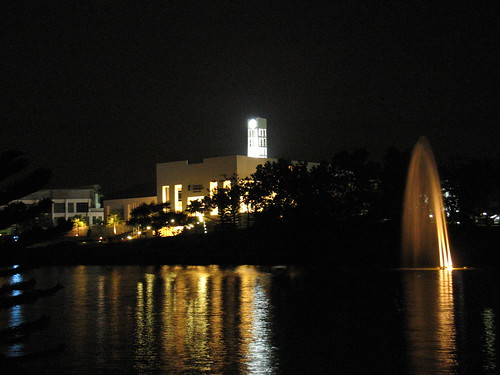
The UNMC administration building opposite the lake at night.
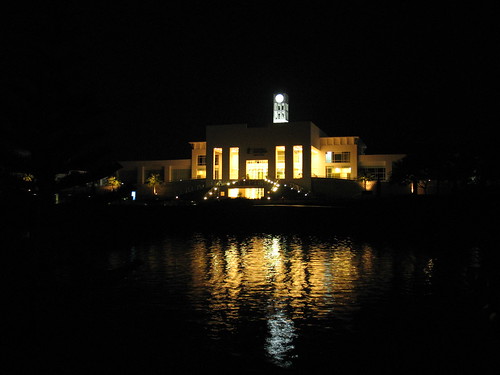
A closer view of the administration building.
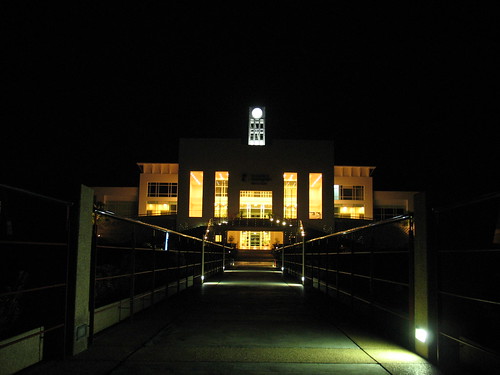
View from across the pedestrian bridge.
More photos are expected to follow, but the bad news is I haven't taken any new photos since those I'd already posted here!
Coming up next: A tour of campus facilities
Monday, September 29, 2008
Postcards from Nottingham (Part II)
The following is a continuation from Part I.
After showing the place where I live, it's time to take a look around the campus of the Universiity of Nottingham Malaysia Campus (UNMC)...
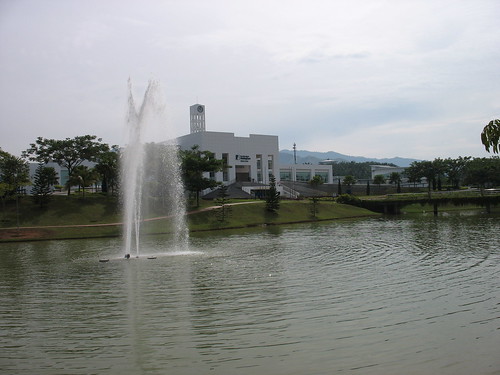
This photo shows the features of all University of Nottingham campuses - a white building, a clock tower and a lake. The white building is the administration block.
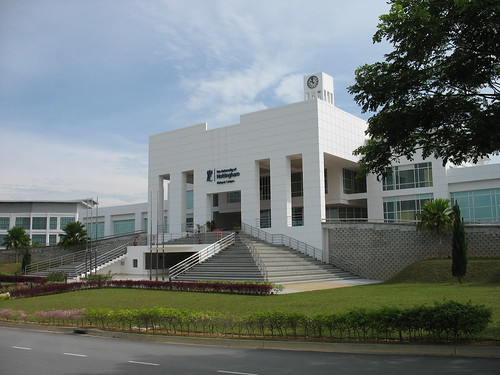
A closer view of the administration building.
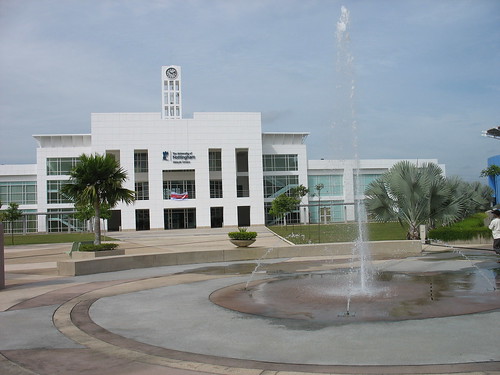
The back of the administration building, viewed from the Academic Plaza.
The Academic Plaza is enclosed by the main academic buildings and incorporates a fountain and an amphitheatre.

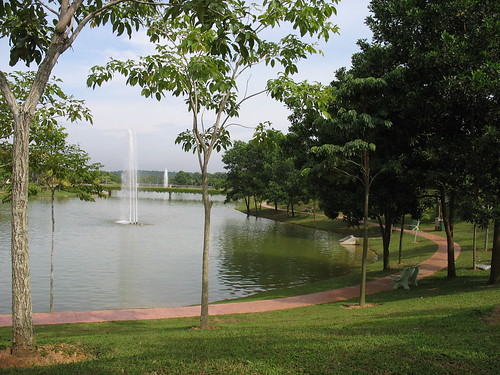
The university park where there is a jogging track.
Sometimes ducks can be seen in and around the lake, but I didn't manage to capture that photo. Maybe next time.
Coming up next: Night scenes
Monday, September 22, 2008
Postcards from Nottingham (Part I)
Finally, after spending two months at the University of Nottingham Malaysia Campus (UNMC) and completing a semester, the photos I promised are here... Enjoy!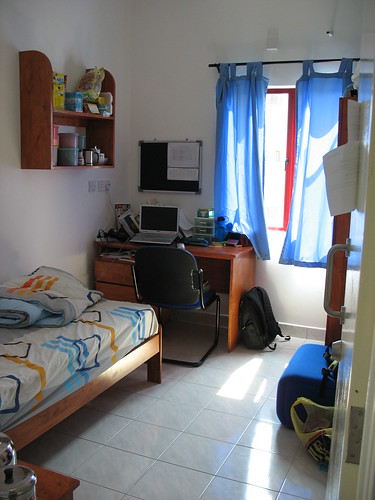
My room, my second home.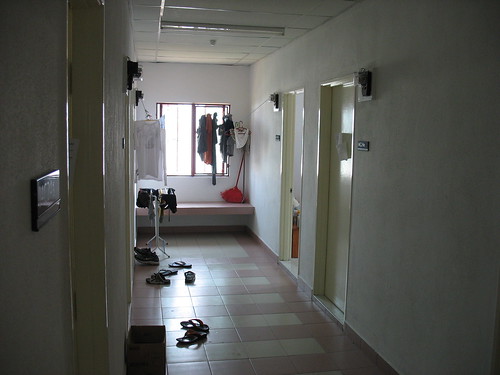
The unit where I live - consisting of 5 single rooms and one bathroom. My room is the one with the door open.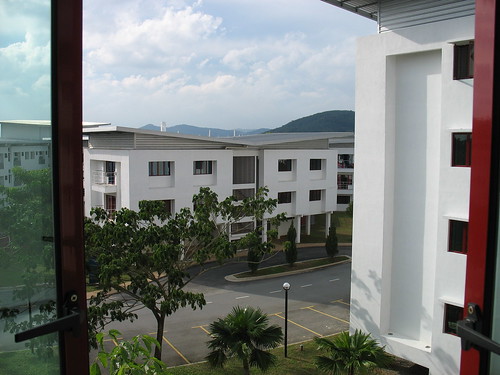
View from the window of my unit. The faraway hills makes this place look like a resort.
Coming up next: Around the campus
Saturday, August 23, 2008
My lecturer visited my blog
Roughly 3 weeks ago, I wrote a post entitled “No easy life in Nottingham” with the sole purpose of keeping my friends informed about life in the University of Nottingham. I chose to tell about academic life here, so naturally my topic revolves around classes and lecturers. Because my friends are currently pursuing their studies taking different routes like Form 6, A-Levels and Foundation, I felt that it was informative to include comparisons between here and elsewhere.
On Thursday, I was surprised that my lecturer for the Light, Waves and Electron module, Dr. Khiew, left some comments in my Shoutbox regarding what I’ve written in that post.
PSkhiew Thanks for the comment. I understand that you are one of most smart student I have and seems like the module is abit easy for you...
PSkhiew Please remember that we need to deal with many types of students that came in with different entry qualification.
PSkhiew Hence, the structures of "A" modules have been designed that they only cover revision on the subjects you have learned in SPM or O-level.
PSkhiew Correct, I seldom discuss about the formula derivation during my class.
PSkhiew This is due to the reason that engineering and physics are two different contexts eventhough they are inter-related to each other.
PSkhiew Engineering is the extension of the fundamental theories to the application.
PSkhiew You are an engineering student, we should train you to use equations to solve research problem.
PSkhiew Due to the time constraint in the class, instead of using the limited time for formula derivation,
PSkhiew I would rather to use it for explaining more on solving problem using the equation/formula.
PSkhiew Mr. Wee is your physics lecturer, the way of teaching physics of course will be abit different compare to mine.
PSkhiew Nevertheless, if you believe that formula derivation is important and you are interested to learn about it,
PSkhiew I would be happy to have the discussion with you after the class.
Firstly, to Dr. Khiew. I would like to thank him for spending time reading my blog, commenting, and saying that it’s OK to have a discussion with me after class. I truly appreciate that. Regarding his comments, I would like to clarify that what I’d written was not a formal complain – it was just a way of me informing readers that the situation here it’s like that and what I think about it – whether it’s a good or bad thing, I leave it up to them to decide. The issue of derivation of formulas may be trivial to many; I brought up this issue only because I feel that the derivation of formulas is an important part in learning Physics. Some may agree and some may not. I don’t blame Dr. Khiew for not teaching derivations, since he already gave his reasons about time constrain during class. In my blog post I’m actually telling my friends that in Form 6 or A-Levels that there is more depth in subject matter compared to Foundation here. As for his comment about me finding his module easy, I would like to say that each module has its own challenges; I wouldn’t dare to say that I know everything about Light, Waves and Electrons. I’m still in the process of learning, and I’m fortunate to have Dr. Khiew as my lecturer because he can explain the subject matter well, hence I find it easy to understand.
Secondly, my post dated August 1 comes at a time when I’m still adjusting to life here in Nottingham. Like they say, the grass is always greener on the other side. Things may have changed, and my thoughts and opinions may be different now. I’m sorry if any other lecturer became the victim of my excessive comparison between here and elsewhere. Like what Dr. Khiew mentioned, each lecturer has his/her own teaching style, so he/she cannot satisfy the needs of everybody. I would cooperate with any lecturer regardless of my personal opinion towards that person. All in all, I’m generally quite satisfied with the quality of teaching here in Nottingham and have no intention to leave this place until I get my degree.
Lastly, I would like to stress that I’m a person that deals with issues, and I have nothing personal against anybody unless somebody gets personal with me – and I really don’t want that to happen.
Sunday, August 17, 2008
Assignment: Computer concept map
Computer Concept Map Software Hardware Computer components System unit System software Processor Operating system Memory Application software Input device Output device Monitor Keyboard Supercomputer Data Information Mouse Printer Microcomputer People Personal computer Mainframes Legend Subset of Flow of data/ information Related to Computer literacy For reference only. © WJ. Revised: 17 Aug 2008
What is this? From time to time, I'll be posting the assignments I did here at the University of Nottingham in my blog just to share with everybody my work instead of just showing it to my lecturer, so that my efforts seem more worth it. However, no warranties are provided, except that my lecturer has gone through it. But then again, the only result from passing up our assignments to her are a few ticks here and there...
Friday, August 1, 2008
No easy life in Nottingham
This is the end of my third week in the University of Nottingham Malaysia Campus. You may notice that my blog hasn’t been updated for about 2 weeks. Why? The short answer is in the title of this post, while a more detailed answer will follow as you continue to read this post.
Although my short stint in Malacca High School seems like a distant memory to me now, but I still can remember what the teachers there used “brainwash” Form 6 students about how you can have an easy life in college. They say, “If you want an easy life, go college lah! In Form 6, you must be prepared to slog!” (Although I’m technically a university student, but I still categorize myself as a college student, because saying that I’m a university student would give the impression that I’m an undergraduate.) No doubt that life is a little easier here, but in no way that I’m passing my days as if each day is a holiday. To let you have a “feel” of my life in Nottingham, I’ll start off with writing about the subjects (they call it modules) I’m currently taking in Sem 0 of my Foundation in Engineering course.
Light, Waves and Electron A (EN0 LWA)
Lecturer & Tutor: Dr. Khiew
Duration: 2 hours lecture, 1 hour of example class per week
Time: Monday, 2 – 5 pm
This is basically a Physics-related module where we learn about mostly light and waves, for example lenses, interference of waves and so on. Dr. Khiew is my only lecturer with a PhD. We have 2 hours of lecture where he lectures while showing PowerPoint slides and another hour of doing exercises. His lessons are quite easy to understand, but what I don’t like about his lessons is that he refuses to derive some of the formulas we encounter, like the lens formulas. He would say that we are engineering students, so it’s enough to know how to apply these formulas... I wonder what Mr. Wee will say about this.
Basic Mathematical Techniques (HG1 BMT)
Lecturer & Tutor: Mr. Balrama
Duration: 2 hours lecture, 1 hour of example class per week
Time: Monday, 9 – 11 am; Thursday, 11 am – 12 pm (Example class)
This module is taught by a quite experienced-looking man, though I'm feeling that we're moving too slowly. What we learn here is basically what we learn before in Form 4 and Form 5, like indices, inequalities, progression and so on. But the questions given can be quite tricky in such a way that befits our age. It’s like a tougher form of the SPM Mathematics syllabus.
Properties of Materials (EN0 POM)
Lecturer & Tutor: Mr. Chiang
Duration: 2 hours lecture, 1 hour of example class per week
Time: Tuesday, 2 – 5 pm
Fondly (the opposite is true) known as POM. The lecturer of this module claims to be the funniest lecturer in the University, and true enough, he likes to crack jokes. He has something funny to say every few minutes or so, but then some are not so funny… Anyway, this module is a mixture of Chemistry and Physics, but it’s still more related to Chemistry than Physics. Examples of topics covered are atoms, bonding, crystals and gases. And even worse than Chemistry in secondary school, this module requires a lot of memorizing. Well, we’re supposed to know about the properties of materials, and the only way is to memorize them.
Basic Engineering Mechanics A (EN0 BMA)
Lecturer: Mr. Lim
Duration: 2 hours lecture, 1 hour of example class per week
Time: Wednesday, 2 – 5 pm
This is another Physics-related module that everybody who studied Physics before is familiar with. Topics covered in this module are usually discussed at the beginning chapters of most Physics textbooks. It includes physical quantities, vectors, kinematics, Newton’s Laws up to work and power.
English Language and Study Skills Introductory (EN0 ELI)
Lecturer: Ms. Cecily
Duration: 4 hours per week
Time: Tuesday, 11 am – 1 pm; Thursday, 9 – 11 am
English lessons again… the most boring and useless (the study skills part) subject (that’s what I think). The difference is that we’re learning academic English, not the story-telling kind of English but English based on cold hard facts (my emphasis). I can't deny that I learned something more about the English language especially the grammar part, but there’s nothing more to that. And this module is supposed to teach us study skills, which I doubt it will reach its objective. In order to “teach” us study skills, this module requires us to submit a so-called study diary to our lecturer each week. And my lecturer is going on very slowly, so I wouldn’t learn much actually.
IT and Design A (XX0 C02)
Lecturer: Ms. Geetha
Duration: 2 hours lecture, 1 hour of example class per week
Time: Thursday, 2 – 5 pm
The lecturer for this module has the easiest time. A Masters Degree holder currently pursuing her PhD in my university, she spends the least time with us. Her class ends at 3.30 pm at most (so far) and she leaves us doing the exercise she gave us. For the past lessons, the exercises given involved finding information about IT-related stuff. We have to arrange the information we found in a folio, and we have to hand it in the following week.
Malaysian Studies (MPW2133)
Lecturer: Ms. Evans
Duration: 5 hours per week in one day (!)
Time: Friday, 12 – 5 pm
It’s Sejarah all over again during Malaysian Studies. Not everything is about History though, because we also will learn about the Malaysian parliament, government and its policies, kind of like Paper 1 of Pengajian Am in Form 6 if I’m not mistaken. Ms. Evans, a Masters Degree holder too, is a part-time lecturer at Nottingham and she’s the best History teacher I’ve ever had (because my previous ones suck). She knows the history of Malaysia like the back of her hand. It’s quite interesting learning about the history of Malaysia actually, but I shudder at the thought of squeezing all these facts into my head again to sit for tests.
Lab
Supervisor: Mr. Tan
Duration: 2 hours per week
Time: Wednesday, 10 – 11 am
This is not a module on its own, but just a slot in our timetable where we carry out Physics and Chemistry experiments. I can’t comment much here because lab sessions are only on next week.
Now you can see what my coursemates and I have to go through each week. According to our timetable, we have an average of 5.2 hours of classes per day, sort of like the time spent for classes in school if you’re in Form 6. And this does not include breaks. But of course, Form 6 students will have lots of extra classes, and some of my lecturers are “kind” enough to give early dismissals.
Phew, what a long post I’ve written. However, it won't end just yet. Proves that I’ve a lot of free time right? Nah, this is just to compensate for the drought of updates in my blog for the past two weeks. If you don’t believe me, let me show you why my hands are not empty.
- Malaysian Studies assignment about Home Ministry – 10 pages worth of research to be done by the end of this semester.
- Malaysian Studies presentation – my group is planning to do a video about the Malaysian Parliament. If all goes well, it may be uploaded on YouTube.
- Tests! Next week I have English, Malaysian Studies and POM tests. And I’ve been to Form 6 long enough to know that their monthly tests also fall on August. Proves that we’re moving at a very fast pace (not exactly, just joking). Yesterday I just had my BMT quiz, a small test that was over in 20 minutes. All of these tests will contribute to my final results.
One more thing, for the very first time, I’ll be spending my weekend at Nottingham. I still haven’t thought of what to do over the weekend. Living full-time in Nottingham can be described as living like a frog underneath a well; the only contact with the outside world is through the phone, internet, newspapers or taking a bus ride out of this “well”.
P.S.: The JPA scholarship results for 9A students are out, and I was offered a scholarship even though I stated my institution as Nottingham. Moreover, the ever-you-know-what JPA still keeps people guessing about the details of this scholarship. If they sponsor foundation students like me too, don’t you think that it’s better to do foundation here at a prestigious (again my emphasis) university like mine fully-sponsored rather than studying Form 6?
P.S. 2: A big salute to those who managed to read each and every word of my 1000-plus-words post.
P.S. 3: To those who want to see photos, I would say this: Since a picture is worth a thousand words, therefore I've just posted a very clear picture of Nottingham, don't you think? OK, OK, I'll try to get some photos during this weekend. But then when I'll be posting these photos will be another unknown...
UPDATE: To avoid any misunderstandings especially regarding my comments on classes and lecturers, please check out my follow up to this post.
Sunday, July 13, 2008
A Freshman’s Guide to the UNMC
The writer of this guide is currently an Engineering Foundation freshman who has only spent one night at the University of Nottingham Malaysia Campus (UNMC).

A Brief Introduction to UNMC
The University of Nottingham traces its origins to the founding of an adult education school in 1798. The foundation stone of the original University College Nottingham on Shakespeare Street was laid in 1877, with a speech by former UK prime minister, William Ewart Gladstone. This building was formally opened in 1881 by Prince Leopold, Duke of Albany.
A large gift of land allowed University College Nottingham to move to a new campus in 1928. This development was supported by an endowment fund and public contributions. The transfer was made possible by the generosity of Sir Jesse Boot, who presented 35 acres to the City of Nottingham in 1921. In 1948, University College Nottingham received its Royal Charter, which gave it the title of “university” and the power to confer degrees. The name changed from University College Nottingham to The University of Nottingham. Previously, the institution’s students received their degrees from the University of London.
The Malaysia Campus of University of Nottingham, at that time occupying the MISC Building in Jalan Conlay, welcomed its first students in September 2000. The Semenyih Campus built later sits on a 101 acre site, 30 km from Kuala Lumpur and 3 km from Semenyih town. It opened in August 2005 and teaching began in September 2005. It is the first purpose built campus of a British university outside the UK.
The University of Nottingham is ranked in the UK's Top 10 and the World's Top 70 universities by the Shanghai Jiao Tong (SJTU) and Times Higher (THES) World University Rankings.
Location Map
View Larger Map
Location map of the Semenyih campus.
Campus Map
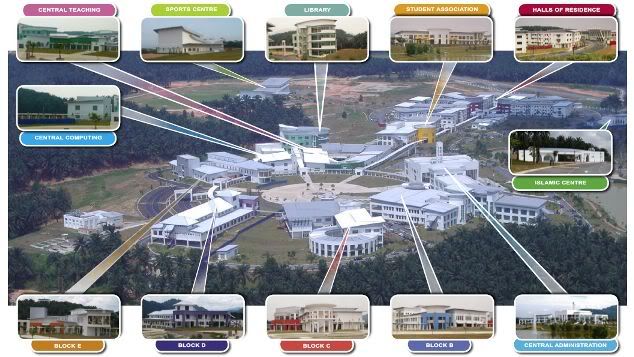
Pangkor and Kapas Halls (new buildings) are not shown in this outdated photo.
Facilities
- Broadband access
- 24 hours' access to computer facilities
- Computer Laboratories
- Language Laboratories
- Science/Engineering Laboratories
- State of the art learning and teaching facilities
- Library
- Study Area
- Health Centre
- Purpose built sports facility including gym, basketball, squash, tennis courts
- Jogging Tracks
- Swimming pool
Accomodation
University-arranged accommodation choices are the on-campus Halls of Residence (Tioman, Langkawi, Redang, Pangkor and Kapas Halls) or off campus at TTS2, TTS4 and TTS5. The University has appointed Pioneer Century Sdn. Bhd. to manage all university-arranged accommodation. Rental rates range from RM330 to RM850 per month. Cleaning services are provided.
Students can also rent rooms or whole houses independently from nearby housing estates.
Food
The nearest place to find food is at the cafeteria in the Student Association building. Food there is usually given low ratings by students and therefore they only eat there when there are no other choices.
One alternative is catering food from outside where they will deliver food to the campus. Another alternative is to travel to Broga or Semenyih town to find food personally.
Laundry Services
Coin operated machines for washing and drying (at RM3 per usage) are located at the end of Langkawi and Redang Halls.
There is also a laundry operator that provides services of washing and ironing.
Internet Access
Most campus buildings except the Halls of Residence have wireless access points for connection to the internet. Internet access via the university network is filtered so chatting and P2P applications may not function correctly.
Students living in the Halls of Residence are provided internet access there if they subscribe to the Student Network Services (SNS) at RM252 for one semester. Chatting applications are supported by the SNS, but P2P traffic remains blocked.
Consumer internet services like Maxis Broadband and Celcom Broadband may be available in some areas. TM Net hotspots can also be found in many parts on campus except at the Halls of Residence.
End note: The writer does not guarantee the accuracy, integrity and quality of this guide. However, comments are most welcomed. More information about the UNMC can be found at the UNMC website.
Thursday, July 10, 2008
From the University of Nottingham
This will be a short post because the writer is freezing inside the university's computer lab.
Today I'll be spending my first night at the University of Nottingham Malaysia Campus (UNMC).
This morning, I went together with Kee Weng in his parent's car to the campus for registration. Quite a number of Malaccans were there getting registered, some of them whom I know through Mr. Lim's Chinese tuition. Also met Isaac Chin there and we had lunch together with his group of friends.
The evening was rather boring. Isaac invited me to play badminton at the sports complex but the 2 badminton courts were occupied. Moreover, I didn't bring my badminton racquet...
Just now, about 4 hours ago, I went together with Isaac's group of friends to Broga to have dinner. One of his friends has a car. Anyway, five dishes of Chinese food and adding a few bowls of rice and the bill turns up to be only RM58 (for 6 people), so RM10 for each one. Quite cheap for a very filling meal if you ask me.
After dinner, I went to, and this is where I am now, the computer lab to try the university's internet connection. My hostel has no internet connection unless I cough up more than RM50 per month, so naturally I would rather not do so. The connection is quite fast, I would say faster than my Streamyx connection at home at optimum performance. By optimum performance, I mean when not many people are using it. Even with mostly Foundation students currently residing in the University now, I am experiencing occasional slowdowns... YouTube failed to load a moment ago. And the university blocks P2P traffic like BitTorrent, so I cannot fully take advantage of its speed.
OK, signing off here because it's cold here [rubs both hands together] and it's late. Expect more about the UNMC after the induction session and when I get home tomorrow.


